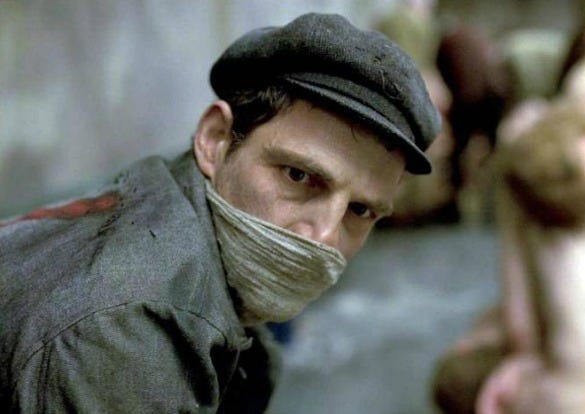Son of Saul

Just when you think the story of the Holocaust has been covered from every perspective, every angle, every storytelling form possible, along comes a film like “Son of Saul” to remind us that great tragedies never really end — their human echoes continue to reverberate and disturb.
“Saul” uses many of the same techniques as last year’s Oscar-winning “Birdman,” and indeed this film has been nominated for its own Academy Award as the foreign language entry from Hungary. The camera floats around the main character, a Sonderkommando working in the crematorium of Auschwitz circa 1944, in long languid takes.
A Jew kept alive to dispose of the bodies of other Jews, Saul (Géza Röhrig) has some measure of authority and protection from the German guards. But their own time is coming, as the head Sonderkommando learns they are about to be replaced and disposed of, so their memories can die with them. They quietly begin planning an uprising, stashing weapons and so on.
Director László Nemes, who co-wrote the screenplay with Clara Royer based on years of research and testimony by the actual concentration camp workers, keeps things unnervingly in our face. Most of the footage is close-ups of the main actor, with a purposefully short focal plane so everything a few feet past him is blurry.
This shallow focus is the breathtaking counterpoint to Gregg Toland’s use of deep focus in “Citizen Kane.” It’s a pioneering new way of looking at things that also serves a key narrative purpose: keeping us inside the tunnel vision of Saul, who sees what he needs to and blocks out what horrors he can.
Until, that is, Saul witnesses something he cannot ignore.
A young Jewish boy survives the gassing, and the German doctor is brought over to examine the medical marvel. After contemptuously ending the lad’s miracle with his own hands, the physician orders an autopsy. Witnessing this, Saul decides to intervene, claiming the boy as his own son, and determining to give him a proper Jewish burial — with the reading of Kaddish by an actual rabbi.
Is the boy really Saul’s own flesh and blood? It seems quite unlikely. When Saul shares his plans, his fellows remind him he has no son.
But Saul, heretofore known as a ghostlike presence who goes along to survive, has clearly made an irrevocable choice. Röhrig, with his hard-angled face and deep penetrating eyes, is a revelation in the role. His mission may not make any kind of cognitive sense, but it’s the journey of a restless spirit with but one purpose left in life.
Saul wanders around the camp, trying to find a rabbi, asking questions, sneaking into places he shouldn’t go, sticking his neck out, endangering the rebellion. One man dies as a direct result of his actions. But Saul does not waver. As the time of crisis grows closer, here is one man madly risking his life for a small, meaninglessly act of decency.
Is it worth it? Is he right, or terribly wrong? Does it matter?
“Son of Saul” is an unspeakably powerful film not about striving for life but facing a death that is inevitable. Saul chooses the path of his own unmaking, and in doing so finds grace amidst the ravages of hatred and mass murder.
Astonishingly, this is the debut feature film of László Nemes and, I hope, the first of many.



